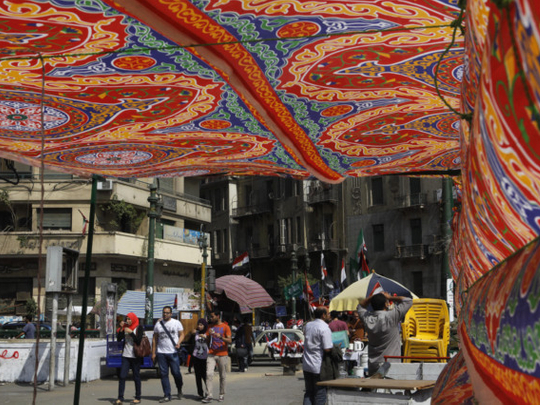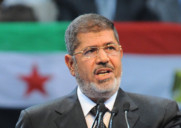
CAIRO: Massive nationwide protests that Egypt’s opposition plans for June 30 are taking on a dangerous edge.
Opponents of President Mohammad Mursi are convinced that this is the best and perhaps the last opportunity to drive him from power. They say they have tapped into widespread public discontent over shortages, broken infrastructure, high prices and lack of security, and can bring that anger into the streets.
Mursi’s Islamist backers have vowed to defend the president with counter-demonstrations. Police have signalled they want to stay out of the conflict. The powerful military, widely suspected to be at odds with the president, is keeping its cards close to its chest.
Heightened polarisation
As a result, fears are high of potential violence on the day, the anniversary of Mursi’s 2012 inauguration as Egypt’s first freely elected leader.
The date is shaping up as the culmination of polarisation that has sharpened throughout the year. Protests erupted repeatedly the past year — frequently leading to clashes with Islamist supporters of Mursi — but often they were fuelled by particular issues like political manoeuvres by Mursi or police brutality.
This time, Mursi’s opponents, led by a mix of liberal and secular movements and street activists, say the sole purpose is to force him out by showing the extent of public rejection of his presidency.
Many talk as if that is a matter of “when” and not “if.” They plan ambitious “post-Mursi” steps: suspending the Islamist-backed constitution and naming the chief justice of the Supreme Constitutional Court as interim president, followed by the drafting of a new constitution by a panel of experts, and new presidential elections.
“We will take to the streets and the squares and stage sit-ins,” said Hossam Mustafa, the chief organiser for the protests in southern Egypt. “We will not leave until the president leaves. We will win back Egypt for all Egyptians.”
Already, protest organisers have clashed with Mursi supporters in several parts of the country, including clashes in the Nile Delta city of Tanta on Tuesday that left 10 injured. On Sunday night, clashes in the oasis province of Fayoum southwest of Cairo left at least 100 injured, and similar fights have broken out in the Mediterranean port city of Alexandria and the Nile Delta city of Damanhour.
In anticipation of possible violence, the gates of Mursi’s Cairo presidential palace have been reinforced. The walls of the headquarters of the Muslim Brotherhood, the Islamic group from which the president hails, have been fortified.
The protest campaign is rooted in an activists’ petition drive the past few months called ‘Tamarod’ — or ‘Rebel’ — that claims to have collected up to 15 million signatures on a call for Mursi to step down and for early elections to be held. Organisers of the campaign say its success shows how anger at the government and the Brotherhood has transcended the core opposition to the public at large.
Counter-campaign
“The will of Egyptians is stronger than anyone,” Tamarod spokesman Mahmoud Badr told reporters. “The Egyptians who removed the tyrant Hosni Mubarak will most certainly be able to remove the failed tyrant Mohammad Mursi.” He vowed the protest campaign can continue as long as needed, even as summer temperatures rise and Ramadan set to start by July 10.
Mursi’s supporters, in turn, have depicted the campaign — and the planned protests — as an attempt by supporters of ousted autocrat Hosni Mubarak to overturn democracy. Mursi, whose term is four years, has vowed to deal “decisively” with those trying to force him out.
Senior Brotherhood leader Essam Al Erian told The Associated Press that the protest calls are “unconstitutional, illegal and irrational” and are not backed by genuine popular support. He cast doubt on the Tamarod signatures, reflecting claims by Mursi supporters that they are forged.
Raising the spectre of clashes, Al Erian said Mursi’s supporters would defend the presidential palace in Cairo’s Heliopolis district if “state institutions” fail to defend it against the protesters.
Some hardline clerics have issued fatwas, or edicts, saying that organisers and participants in the planned protests are “kuffar,” or non-believers, who deserve to be killed. Assem Abdul Majid, a senior leader of the hardline Jamaa Islamiya, said the protest organisers are communist and “radical” Coptic Christians. “It is another phase of the counter-revolution that we have suffered from for so long,” he said.
Hanging over the June 30 plans is the sense of a year’s building tension coming to a head, centered on the question of the basic legitimacy of the troubled political system that emerged after Mubarak’s fall in February 2011. In the polarisation, talk of national reconciliation is falling on deaf ears.
Widespread frustration
The anti-Mursi campaign has been fuelled by widespread frustration over a host of troubles in the nation of 90 million people, from surging crime, rising prices and unemployment to power cuts, fuel shortages and traffic congestion. Many of those signing the Tamarod petition have blamed Mursi for failing to deal with the problems.
“It is a surrealistic and absurd regime that will not and cannot be allowed to continue,” said reform leader and Nobel peace laureate Mohammad Al Baradei.
Islamist parties loyal to Mursi were planning protests of their own and considering occupying sites where the president’s opponents plan sit-ins on June 30.
— AP











